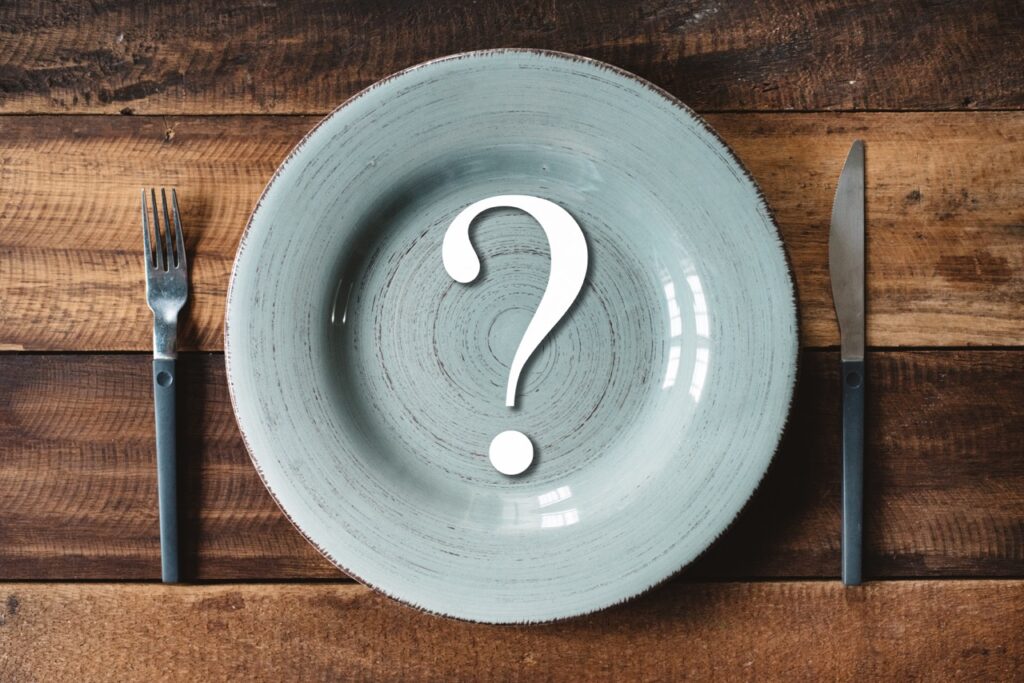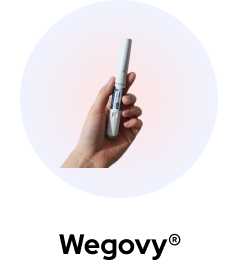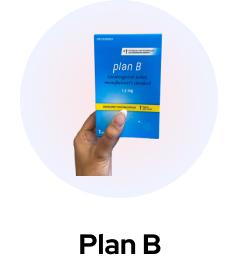While Ozempic is considered to be a safe drug, there are a number of interactions you should be aware of when taking this medication.
In this article we’ll cover:
- What Ozempic is and how it works
- What you need to know about Ozempic and food
- Foods you should avoid while on this drug
- How Ozempic interacts with medical conditions
- Those who should avoid Ozempic
- Ozempic’s known drug interactions
- What else you should consider when on Ozempic
- Precautions to take
- Frequently asked questions.
Let’s drive straight in!
Ozempic is a prescription medication designed to treat adults with type-2 diabetes and those with a BMI of 27 or higher. Manufactured by Novo Nordisk, you may also see it under brand names Wegovy or Rybelsus.
Containing semaglutide as its active ingredient, it mimics the function of the naturally occurring glucagon-like peptide-1 (GLP-1) receptor agonist hormone. This then is able to affect insulin production and glycemic control, and, as a positive side effect, may assist with weight management.
These factors make semaglutide an excellent drug for the treatment of type-2 diabetes and those with obesity who need assistance with weight management. It is most effective when paired with other lifestyle intervention, such as a healthy diet and regular exercise.
Your Ozempic prescription may be covered in full or part by your insurance provider, but you’ll need to contact them to confirm the terms of your coverage.
Health Canada has approved Ozempic for use in adults only. It is not approved for use in those with type-1 diabetes, or for children.
Ozempic mimics a hormone in your body called glucagon-like peptide-1 (GLP-1). It is part of a class of drugs known as GLP-1 receptor agonists. Other drugs in this category include Wegovy, Rybelsus, and Trulicity.
The hormone GLP-1 plays a crucial role in managing blood sugar levels and regulating appetite. It does this by affecting the hunger receptors in the brain, which enhances satiety, reduces hunger, and leads to a lower calorie intake. It also slows stomach emptying, which helps you to feel full for longer.
Ozempic has also been shown to help your pancreas produce more insulin when blood sugar levels are high. The combination of these effects is very helpful when it comes to achieving and maintaining positive weight management.
Understanding Ozempic Interactions with Food
Now you know how Ozempic works, but how do different foods affect its effectiveness?
Although Novo Nordisk doesn’t indicate any particular foods that need to be fully eliminated when taking Ozempic, there are some that can cause trouble if eaten in excess.
High-Fat Foods
Ozempic associates with high-fat foods which may cause a worsening of side effects. These are mainly gastrointestinal — nausea, stomach pain, diarrhea, and constipation.
As fatty, greasy foods are more likely to exacerbate these issues, it’s best to avoid too many when taking Ozempic, especially as delayed gastric emptying means that foods will spend more time sitting in your digestive tract!
Sugary Foods and Drinks
Although there’s no need to give up sugar foods entirely, it makes sense to take it easy when it comes to your sugar intake. This is because Ozempic influences blood sugar levels in diabetes conditions.
Alcoholic and Caffeinated Beverages
While both alcohol and caffeine are okay in moderation, they both have the capacity to worsen side effects such as nausea or stomach pain, plus Ozempic reacts different when mixed with caffeinated beverages.
It’s important to ensure you stay hydrated when taking Ozempic, as dehydration can lead to constipation. Both alcohol and caffeinated drinks are known to be dehydrating, so it’s best to consume them moderately.
Vitamin and Mineral Supplements
While Ozempic is generally fine to take with most vitamin and mineral supplements, it may counteract with certain over-the-counter medications and have potential conflicts with certain dietary supplements.
Specifically, be sure to talk to your medical team if you’re taking chromium supplements as these have been found to interact with Ozempic and can exacerbate the risk of low blood sugar.
Foods to Avoid While Taking Ozempic
While there’s no need to completely cut these foods from your diet, it’s a good idea to enjoy them in moderation.
Fried, Greasy Foods
While these foods are fine in moderation, eating too many greasy, fried foods can contribute to feelings of nausea and stomach discomfort. They may also sabotage your weight loss attempts, as they are high in calories.
Ozempic complements certain healthy foods, so try to include more low-sugar, slow-release foods, as well as low-GI fruits and vegetables.
Sugary Foods and Drinks
Sugary foods and drinks contain high levels of fast-acting carbohydrates that can lead to rapid spikes in blood sugar levels. These spikes may counteract Ozempic’s effectiveness.
Try to limit your intake of sugary sodas, candies, and pastries.
Refined Carbohydrates
Similar to sugary foods, refined carbohydrates can cause a spike in your blood sugar which may limit Ozempic’s effectiveness.
High-Glycemic Vegetable
Some vegetables like corn and potatoes can cause a spike in blood sugar levels.
Try replacing these vegetables with leafy greens or low GI vegetables to make sure you get the most benefit possible out of Ozempic.
Alcohol
Drinking alcohol can contribute to some of the negative side effects of Ozempic, such as nausea and dizziness.
Interestingly, there are some reports that taking Ozempic can reduce patients’ desire to drink alcohol, so it could be a good time for you to cut back on your consumption!
If you’re choosing to take Ozempic, it’s crucial to understand how Ozempic responds to different medical conditions.
Diabetes Type 1 & 2
Type 2 Diabetes
Ozempic was initially developed for type-2 diabetics and is shown to be effective in helping manage blood sugars. It is a good choice for those that have not been able to control their blood sugar with other more common medications, such as metformin.
If you experience sweating, blurred vision, or dizziness, you could be suffering from hypoglycemia. This is more common if you’re also on either insulin or sulfonylurea.
If you experience this symptoms, contact your medical team immediately, or go to your local ER.
Type 1 Diabetes
Ozempic is not a substitute for insulin, and should not be used by those with type-1 diabetes.
Heart Disease
Ozempic can be beneficial for individuals with heart disease, as it has been shown to reduce the risk of major cardiovascular events in people with type-2 diabetes and known heart disease.
Nonetheless, patients with heart disease should use Ozempic under careful medical supervision, ensuring any changes to symptoms or health status are closely monitored.
Thyroid Cancer and Tumors
Ozempic is contraindicated for use in people with thyroid cancer or tumors.
Animal studies show there is a possible link between Ozempic and similar drugs and a higher risk of thyroid tumors, which includes thyroid cancer. Therefore it is not recommended to use Ozempic if you have a personal or family history of these.
Endocrine Neoplasia Syndrome Type 2 (MEN2)
Ozempic should not be used by individuals with Multiple Endocrine Neoplasia syndrome type 2 (MEN2). This rare genetic condition heightens the risk of developing tumors in the endocrine glands, including the thyroid.
When to Avoid Ozempic
While Ozempic has many positive benefits for type-2 diabetics and those with weight problems, there are some circumstances where it should be avoided.
Personal or Family History of Medullary Thyroid Carcinoma
If you or anyone in your family suffers from medullary thyroid carcinoma (MTC), you should avoid using Ozempic. Research shows a link between GLP-1 agonists and an increased risk of thyroid cancer.
Personal History of Multiple Endocrine Neoplasia Syndrome Type 2
Similar to those with a history of thyroid tumors, anyone with a history of multiple endocrine neoplasia syndrome type 2 (MEN 2) should avoid taking Ozempic. This condition puts you at higher risk of all endocrine tumors, and this includes thyroid tumors.
Allergic Reactions to Ozempic or Its Ingredients
If you’ve previously experienced allergic reactions to Ozempic or any of its ingredients, it’s crucial to avoid this medication.
Symptoms of an allergic reaction could include:
- Itching, a rash, or hives
- Difficulty breathing
- Swelling of the face, lips, or throat.
If you experience any of the above, discontinue your use of the drug immediately and contact your medical team, or go directly to your local ER.
If you’ve previously had an allergic reaction to semaglutide or any of the other components of Ozempic, talk to your medical team for alternative treatments.
Ozempic Drug Interactions
We’ve addressed Ozempic interactions with foods and conditions, but what about drug interactions?
It’s essential to disclose any medications you are taking to your doctor when being prescribed Ozempic, but especially if you’re on any of the below listed.
Interactions With Insulin
If you’re taking insulin, make sure you talk to your medical team about the risks before beginning treatment with Ozempic.
Taking insulin and Ozempic together can increase the risk of hypoglycemia, and your doctor may need to adjust your insulin dose.
Interactions With Sulfonylureas
Sulfonylureas are another class of diabetes medications, and just like with insulin, it’s paramount to discuss potential interactions with your doctor.
Combining Ozempic with sulfonylureas can lead to an increased risk of hypoglycemia.
Interactions with Certain Oral Medications
Although there isn’t any definitive data on this, it is believed that Ozempic could affect oral medications due to the process of delayed gastric emptying. This could affect some oral medications where the exact dosage is very important, such as warfarin.
Other Considerations: Supplements, Vitamins, and Ozempic Treatment
Ozempic has potential conflicts with certain dietary supplements, particularly the supplement chromium, and can cause low blood sugar when taken together.
There is no concrete information on its interactions with herbal supplements, but in general, it is recommended to be cautious if you’re taking any herbs or supplements designed to lower blood sugar, such as berberine or bitter melon.
Make sure you talk with your medical team about all supplements you’re taking when getting your prescription.
When it comes to vitamins, there are currently no reports of interactions, but it’s still essential to make sure your medical team is informed of everything you take regularly.
Precautions When Taking Ozempic
As with any medication, it’s essential to educate yourself about potential side effects and interactions.
Make sure you talk with your medical team about any medical conditions you may have, and ensure you have informed them about any medications, supplements, or other products you’re taking. Read all the disclaimers and side effects about Ozempic before you start taking it to ensure your safety.
If you have any history of pancreatitis, gallbladder problems, kidney problems, or diabetic retinopathy, inform your medical team. Regular blood sugar monitoring is also essential, as Ozempic can lower blood sugar levels, leading to hypoglycemia in some cases.
Ozempic is generally not recommended during pregnancy or when breastfeeding, as the effects on the fetus or infant are unknown.
Always communicate any side effects or changes in your condition to your medical team or pharmacist promptly.
Key Takeaways
Ozempic, which is the brand name of semaglutide, works by mimicking the GLP-1 hormone in the body, which helps to manage blood sugars, as well as reduce appetite and delay gastric emptying.
While there are no foods that must be avoided while taking Ozempic, high-fat, sugary, and fast-carb foods can slow your weight management progress, as well as exacerbate some of the side effects of the drug.
Ozempic can have adverse effects when taken by people with certain medical conditions. It is not recommended for individuals with type-1 diabetes, thyroid tumors or MTC, or MEN 2.
There are some drug interactions to be aware of when taking Ozempic. It can interact negatively with insulin, sulfonylureas, and certain oral medications.
Supplements and vitamins are not known to have significant interactions with Ozempic, although taking chromium supplements can lead to low blood sugar.
Make sure you discuss your full medical history with your medical team before starting Ozempic.
Frequently Asked Questions (FAQs)
Are there other interactions with Ozempic not mentioned?
There are no known interactions with Ozempic not mentioned in this article, but this doesn’t mean they don’t exist.
Ozempic is a relatively new drug, and drug interactions can be complex and affected by a number of factors. Take steps to keep your medical team informed about what you’re taking, so they can let you know of any risks as the science is updated.
How does Ozempic interact with over-the-counter medications?
There are no specifically documented interactions between Ozempic and over-the-counter medications. It is theorized, however, that due to the delay in gastric emptying caused by Ozempic, it could affect over-the-counter oral medications.
Make sure you mention any over-the-counter medications you take to your medical team so that they can give you advice.
Are there certain foods that improve the effectiveness of Ozempic?
No specific meals will improve the effectiveness of Ozempic, but eating a balanced and healthy diet is likely to give you the best weight management results. It is also highly recommended that you implement a regular exercise routine.
Ozempic is not a magic bullet for weight management — it works by reducing your appetite — and studies have shown that many regain at least some of the body mass lost when they come back off the drug.
Your results will depend on what you eat and whether you stay in a calorie deficit, as well as tackling any underlying issues with weight and body image.













 (US)
(US)